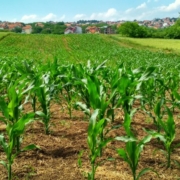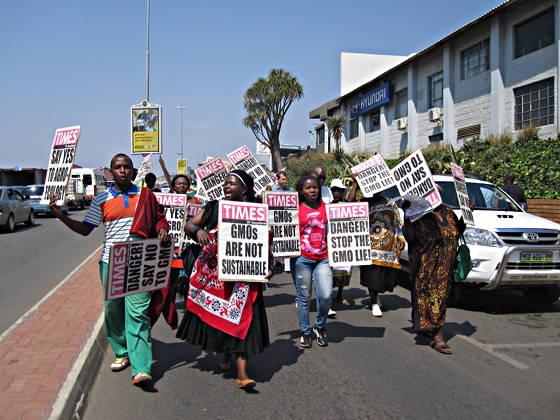Nigeria=Voices Rise against UPOV91 Based Plant Variety Protection Law
On the 23rd of August 2021, a civil society organization, HOMEF together with 101 others released their voices against the UPO91-based Plant Variety Protection Law. This law was earlier rejected by similar organizations in Ghana. With this recent rejection, its clear more African countries will soon come on board. The rejection was based on issues like subsuming small holders’ rights under the breeders’. It is more annoying when the law did not recognize the need for public consultation and stakeholder input before put it in place. For more on this, please read on….as prepared by HOMEF
The Secretary General
The International Union for the Protection of New Varieties of Plants (UPOV)
Genève 20, SwitzerlandDear Mr. Daren TangPetition: Nigerians Reject the UPOV-91 Based Plant Variety Protection Law
The undersigned coalition of farmers, Civil Society Organisations (CSOs), researchers, youth and women groups representing millions of Nigerians and Africans have denounced the adoption of an UPOV91 based Plant Variety Protection (PVP)law in Nigeria. They demand that Nigeria withdraws the law and adopt a sui generis law based on the peculiar agriculture system in the country.
The UPOV regime does not provide equal protection for all as it is difficult or impossible for farmers to claim protection over the materials they have been using overtime. There is no recognition of collective ownership, only individual, private ownership, and procedures are designed for corporations.
• The Plant Variety Protection Act, 2021 should be recalled and replaced with a sui generis law based on the African Model which addresses the peculiar challenges in Agriculture in an all-inclusive and mutually benefitting way. The Nigerian government should take into account international obligations of which it is party to such as the CBD and the ITPGRFA including other measures required to support implementation of these.
• Small holder farmers are the backbone of Agriculture in the country and thus should be adequately supported in terms of favourable policies; infrastructure; extension service; credit schemes; access to land etc. for improved productivity.
• We demand support for farmer managed systems (FMSS), farmers’ rights and our human rights.
• We demand a democratization of our food system, promotion of local solutions and sovereignty for our small holder farmers.
• The government should ensure support and autonomy of public breeding research institutions as these breed varieties for farmers and have an obligation to the public.For more information you can reach:
Nnimmo Bassey: nnimmo@homef.org
Mariann Bassey-Orovwuje: annybassi@yahoo.com
Joyce Brown: joyce@homef.orgThis was endorsed by:
1. Health of Mother Earth Foundation (HOMEF)
2. GMO-Free Nigeria Alliance
3. Corporate Accountability and Public Participation for Africa (CAPPA)
4. Nigerians Against GMOs
5. Environmental Rights Action/Friends of the Earth Nigeria (ERA/FoEN)
6. Nigeria Women Farmers Association (NIWAAFA)
7. We the People
8. BFA Food and Health Limited
9. Association of Women Farmers of Nigeria
10. Women and Youth in Agriculture
11. Udama Co-operative Farm
12. Green Alliance Nigeria
13. Women& Children Life Advancement Initiative
14. The Young Environmentalist Network (TYEN)
15. Peace Point Action
16. Social Action
17. Committee on Vital Environmental Resources (COVER)
18. Gender and Environmental Risk Reduction Initiative (GERI)
19. Eco Defenders Network
20. Urban-Rural Environmental Defenders (U-RED)
21. Host Communities Network
22. Youth and Small Holder Farmers(YOSHOFA)
23. Women Environment Programme (WEP)
24. Lekeh Development Foundation (LEDEF)
25. Nigeria Coal Network (NCN)
26. Global Prolife Alliance
27. Neighborhood Environment Watch Foundation
28. Socio Economic Research and Development Centre
29. Community Forest Watch
30. Niger Delta Development Initiative
31. Kallop Humanitarian and Environmental Center
32. Citizens Information and Development Initiative
33. Relief International Africa
34. Social Accountability and Environmental Sustainability Initiative
35. Institute of Human Rights and Humanitarian Law
36. Greenleaf Advocacy and Empowerment Center
37. Foundation for the Conservation of the Earth
38. Media Awareness and Justice Initiative
39. WastePlus Environmental Services
40. Visible Charity Global Foundation
41. Ogoni Youths Development Initiative
42. Rivers Indigenous NGOs and Civil Society Network
43. Masses Interest Coalition
44. Rivers Network of NGOs
45. Ofure Centre for Peace and Development
46. Foundation for Conservation of Nigerian Rivers
47. Egbema Voice of Freedom
48. Grass to Amazing Favour Global Foundation
49. Rivers Community Content Initiative
50. Jelu New Breed Foundation
51. Rivers Civil Society Organisations
52. BINEC Herbson Development Foundation
53. Angel Support Foundation (ASF)
54. Community Development Advocacy Foundation (CODAF)
55. Egbema Voice of Freedom
56. BRACED Union, Edo State Chapter
57. Center for Environment, Human Rights and Development(CEHRD)
58. ANPEZ Center for Environment and Development
59. Society for Women and Youth Affairs (SWAYA)
60. Pius Dukor Foundation for Community Development and Advancement
61. Canaan Peace, Women and Community Development Initiative (CAPWOCODI)
62. Kallop Humanitarian and Environmental Center
63. Center for Environment, Media and Development Foundation (CEMEDEC)
64. Foundation for Environmental Rights Advocacy and Development(FENRAD)
65. Niger Delta Women International Resource, Environment and Development Center (NDWIRED CENTER)
66. Public Enlightenment Projects (PEP)
67. Greenskill Acquisition Centre Ltd
68. Centre for Justice, Empowerment and Development
69. Centre for Rural Emancipation, Economic and Social Development
70. Child and Green Foundation
71. Sunshine Progressive Youth Alliance
72. Kebetkache Women Development and Resource Centre
73. Rural Health and Women Development
74. League of Queens International Empowerment
75. Alauchi Women Development Initiative
76. Media Awareness and Justice Initiative (MAJI)
77. Rights advocacy & development center (RADEC)
78. The African Centre for Biodiversity (ACB)-South Africa
79. Alliance for Food Sovereignty in Africa (AFSA)-Uganda
80. The African Biodiversity Network (ABN)-Kenya
81. West African Association for the Development of Artisanal Fisheries (ADEPA)-Senegal
82. Coalition for the Protection of Africa’s Genetic Heritage (COPAGEN)
83. West African Committee of Peasant Seeds (COASP)-Senegal
84. Comparing and Supporting Endogenous Development (COMPAS Africa)
85. Eastern and Southern Africa Small Scale Farmers Forum (ESAFF)-Tanzania
86. Fahamu Africa
87. Groundswell West Africa
88. The Fellowship of Christian Councils and Churches in West Africa (FECCIWA)
89. Inades-Formation
90. The Indigenous Peoples of Africa Co-ordinating Committee (IPACC)-South Africa
91. Young Volunteers for the Environment (YVE)-Togo
92. Participatory Ecological Land Use Management (PELUM)-Uganda
93. La Via Campesina (LVC)-Zimbabwe
94. World Neighbors-USA
95. Network of Farmers ‘and Producers’ Organizations in West Africa (ROPPA)
96. Rural Women’s Assembly (RWA)
97. The Southern African Faith Communities’ Environment Institute (SAFCEI)-South Africa
98. PROPAC-Cameroon
99. African Union of Consumers (AUC)-Chad
100. Regional Schools and Colleges Permaculture Programme(ReSCOPE)-Zimbabwe
101. Biowatch South Africa
Comment








